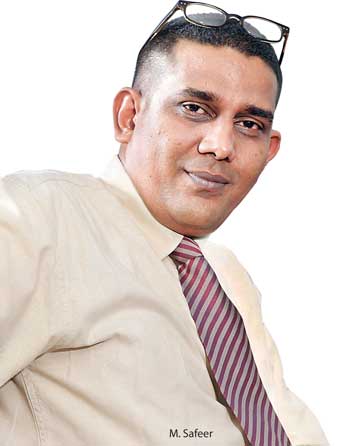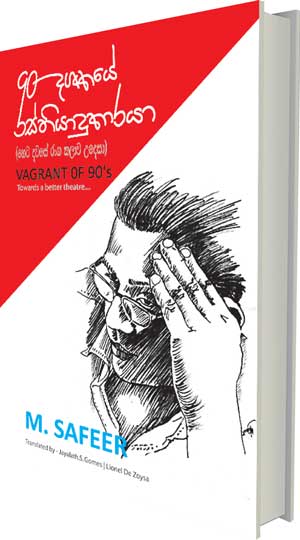Reply To:
Name - Reply Comment
Last Updated : 2024-04-27 00:40:00
Safeer’s book comes across as a must read for theatre artistes, most particularly to those in the South Asian sub continent. Addressing itself to a specificity born out of concerns in the context of Sri Lankan theatre, the book makes a take off point to expand into questions relating to theatre. In the very beginning, Safeer focuses on the problem of dwindling audiences, the concomitant depression and melancholy they give rise to, but hastens to point out that such a situation is consequent to the disillusionment of dreams with which every artiste starts.

He emphasizes the interest of multiple theatre spaces as against the establishment of overwhelmingly large spaces which actually have limited utility, bogged down by their size. From there on, it is a short stride to examining the relationship between the artiste and
the system. Many of Safeer’s formulations are remarkably similar, yet different to what was contained in Harold Pinter’s speech delivered when accepting the Nobel Prize for Literature. In the context of the interplay between art and the system, something on which Safeer’s are expressed with both the tenderness and torment of the artiste in theatre, and the unmoving impersonality of the system. Following an extremely astute and reductive approach, the book is able to point out the justification for giving theatre a voice that can be heard, rather than allowing it to be lost in the labyrinth of an uncomprehending system.
Safeer succeeds in establishing the fact that even if artistes may give the impression of being ‘vagrants’ they are actually the most sensitively sympathetic and anguished by any prevailing human condition which deprives people of the biggest human quality - dignity, and those so called ‘vagrants’ are the silent sentinels who stand guard to protect all that is human, through art - and it is this which gives them the inspiration to sustain their dream, to make it possible for humans to achieve true quality of life.

The book goes on to enumerate the obstacles whilst offering escapes from this shared crisis of theatre, barring a few exceptions, stressing social transformation through theatre, something which equates Sri Lankan theatre with the best theatres in the world.
The author goes deep into all related questions - ranging from the need for a universal theatrical language to the question of organization and theatre architecture - all contributing to the world edifice of theatre.
In spite of the brave front which the book puts up, there are places where the unmitigated agony, an indivisible part of art, makes its way through. The letter to the Director of Cultural Affairs is a record of hurt, pain and torment, but also a fearless statement of fact. It is interesting to note that recognition to artistes in Sri Lanka, because of Safeer’s spearheading the questioning and struggle, has resulted in the issuing of identity cards to artistes which mention his calling.
The book further stresses on the self respect and dignity of artistes - who, if they ask for their due, is not asking for pity, but from a position of strength which only art can provide.
While touching on the government or system’s role, the book seeks to handle the lacunae in official understanding by making suggestions to aid the official machinery, but there is no attempt at aggressiveness or any effort to impose viewpoints - the opening and maintenance of dialogue with officials seem to be a very positive approach - the sharing of concerns may be emphasized to help theatre to spread greater quality of life in greater social contexts.
A major issue the book identifies is the concern for documentation. Not merely the documentation of performance, but also of scripts, so that they are accessible to future generations.
The vibrancy of the contemporary theatre scene in Sri Lanka has, as its biggest example, the Colombo International Theatre Festival, which has brought great honour to the country. All because of the undaunted enthusiasm of Safeer and Gomes, assisted by a band of equally inspired theatre people in Inter Act Art.
However, while writing about it, the author has failed to conceal his tenderness for and torment arising out of this venture. The book says it all, but the exciting detail is that it emerges as a journey in theatre, a record, a documentation of the process which makes the author arrive at the realization that making drama is better than doing drama.
Rich with the theatre experience of Safeer, the book even takes up the complex question of formulating a theatre policy in the country, outlining features essential to such a framing - freedom of artistes, providing basic facilities, sustenance of theatre, preservation, theatre education, opening global doors, experimentation, the establishing of a common public fund. Most comprehensive, and most effectively argued for. While lamenting the decline of theatre, the book does not give up hope, reiterating that even if times may be bad, there is always the possibility of a
better tomorrow.
The nostalgia in the chapter ‘ Vagrants of the 90’s’ is so infectious, so tender, yet the bonding is that of steel - something all theatre artistes are familiar with in their own lives - this nostalgia becomes the foundation for the new beginning. The camaraderie, sharing, was the essence, then as now.
Intentions honoured at all cost, existing in shared struggle, celebrating struggle. Safeer very deftly brings us to the end of the book, which comes as a celebration of struggle, joy, lament and torment, its continuity. To write about it is impossible, it would deprive the potential reader of the exquisite culmination of a sensitive book, and it would be so unfair. In the form of a letter from Saumya Linalage, it is sheer poetry - a perfect end to a thought provoking book which expands and liberates the reader’s mind. The letter goes beyond time, beyond all human limitation and finiteness, taking the reader into a magical world, but one rooted in reality. Read it for yourself, dear reader.

Add comment
Comments will be edited (grammar, spelling and slang) and authorized at the discretion of Daily Mirror online. The website also has the right not to publish selected comments.
Reply To:
Name - Reply Comment
US authorities are currently reviewing the manifest of every cargo aboard MV
On March 26, a couple arriving from Thailand was arrested with 88 live animal
According to villagers from Naula-Moragolla out of 105 families 80 can afford
Is the situation in Sri Lanka so grim that locals harbour hope that they coul